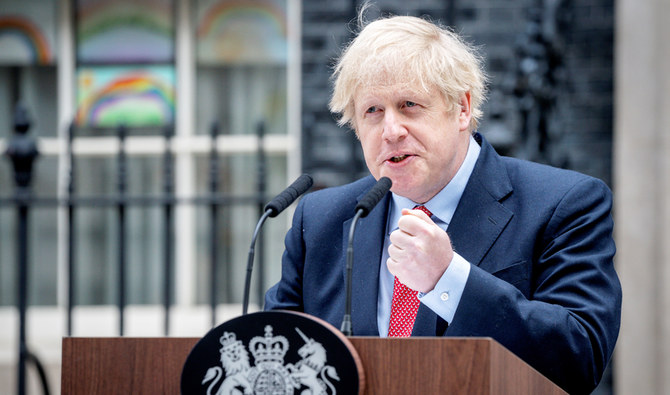LONDON: The UK government has denied ordering up to 50 million home testing kits for COVID-19 from a consortium based in Oxford, weeks after admitting that along with several EU states, it had imported millions of faulty kits from abroad.
The news has dealt another blow to global efforts to contain the virus. UK Foreign Secretary Dominic Raab on Sunday said it was unclear whether the kits were reliable, warning that faulty testing, potentially giving people the all clear when they were still at risk, would be extremely dangerous.
An antibody test that can be taken at home, and that would be able to tell people whether they had already contracted COVID-19 — and therefore possibly built up a level of immunity — has been seen as a key step in developing a global strategy to end lockdowns worldwide that have caused widespread economic damage.
The hope is that by identifying those with a degree of immunity, and by being able to map the spread of infection, governments might be able to safely restart parts of their economies and reopen areas of major cities without risking a “second peak” of infections.
Reports over the weekend suggested that 50 million tests had been ordered from scientists working for the Rapid Testing Consortium at Oxford University — a partnership between four private companies and the university — which has received UK government backing.
HIGHLIGHT
News deals blow to global hopes of home-use kits to help end lockdowns.
The test, based on analyzing antibodies in blood obtained through a finger prick, and differing from the antigen test needed to identify someone with an active case by taking samples from the throat or nasal cavity, supposedly gives positive or negative results for COVID-19 antibodies in under an hour.
But a source at the UK’s Department of Health and Social Care told the Daily Telegraph newspaper that the test had yet to meet approval.
“The claims are overblown. It is premature to be talking about ordering large numbers of a test that hasn’t passed a regulator,” the source said.
Pressure to deliver viable antibody tests has also been driven by a number of existing designs failing en masse in Britain and across Europe.
The UK admitted that it had been forced to return 17.5 million tests bought from China — the source of the global pandemic — earlier this month.
Spain, the Czech Republic, Slovakia and other EU states have also discarded hundreds of thousands of faulty imported kits.
In the US, meanwhile, the Food and Drug Administration (FDA) has come in for criticism after allowing the sale of more than 90 different test kits on the open market that have been described as being of “dubious quality.”
Eric Topol, director of the Scripps Research Translational Institute, told the Financial Times: “Usually you can rely on the FDA to do due diligence and really make sure the test is valid but here the criteria have been loosened. If anything we need more oversight, rather than less.”
The Switzerland-based Foundation for Innovative New Diagnostics said 280 antibody tests have gone into development or reached markets since the start of the outbreak in late 2019.
But none has yet been found to approach 100 percent accuracy, with some registering as little as 30 percent.
Part of the issue arises from the difficulty in accurately identifying antibodies specific to Sars-CoV-2, the virus responsible for COVID-19, when other antibodies are present in a sample.
The UK’s National Covid Testing Scientific Advisory Panel, also based at Oxford University, has so far trialed, and declined, nine different commercially available antibody tests.
Prime Minister Boris Johnson had previously referred to developing an accurate antibody test as a potential “game changer” in the global quest to overcome the virus.
But in a speech upon his return to work on Monday he did not make any reference to such a test, instead imploring people to stick to lockdown guidelines.


























